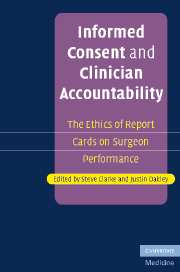Book contents
- Frontmatter
- Contents
- List of contributors
- Acknowledgements
- Introduction: Accountability, informed consent and clinician performance information
- Part I Accountability
- Part introduction
- 1 Clinician report cards and the limits of evidence-based patient choice
- 2 Report cards for institutions, not individuals
- 3 Safety, accountability, and ‘choice’ after the Bristol Inquiry
- 4 Public reports: putting patients in the picture requires a new relationship between doctors and patients
- 5 Adverse event disclosure: benefits and drawbacks for patients and clinicians
- 6 Report cards and performance monitoring
- Part II Informed consent
- Part III Reporting performance information
- Index
- References
2 - Report cards for institutions, not individuals
Published online by Cambridge University Press: 08 August 2009
- Frontmatter
- Contents
- List of contributors
- Acknowledgements
- Introduction: Accountability, informed consent and clinician performance information
- Part I Accountability
- Part introduction
- 1 Clinician report cards and the limits of evidence-based patient choice
- 2 Report cards for institutions, not individuals
- 3 Safety, accountability, and ‘choice’ after the Bristol Inquiry
- 4 Public reports: putting patients in the picture requires a new relationship between doctors and patients
- 5 Adverse event disclosure: benefits and drawbacks for patients and clinicians
- 6 Report cards and performance monitoring
- Part II Informed consent
- Part III Reporting performance information
- Index
- References
Summary
The performance assurance mechanisms that have been proposed over the past decade or so have many aims, some laudable, some less so. Sometimes they are designed essentially as cost containment measures; sometimes they are motivated by a genuine concern for raising the quality of healthcare. In their paper, ‘Informed consent and surgeons’ performance', Clarke and Oakley (2004) argue that data on surgeons' performance should be collected and disseminated for another reason: to provide patients with information they need for genuinely informed consent. Clarke and Oakley suggest that promoting informed consent is vital, inasmuch as so doing respects patient autonomy; a good which is so significant that its promotion trumps most other considerations. Indeed, they give only one example of a good that is important enough to restrict (though not to violate) patient autonomy – surgeon's privacy with respect to their sexual orientation – and explicitly argue that even a reduction in overall surgical utility may not be a weighty enough consideration to justify a restriction on autonomy (2004, p. 19 and p. 23).
I suggest, however, that Clarke and Oakley are mistaken in thinking that respecting autonomy requires giving it weight sufficient to trump most rival goods. Respecting autonomy does not require maximizing it; it requires taking it seriously. We respect patient autonomy by always taking it into consideration in ethical decision-making, just as we respect a person by always taking her interests into consideration, not by treating her interests as trumping all rival goods (if it were the case that respecting a person required taking her interests as overriding, it would require a miraculous harmony of interests for us to be able to simultaneously respect many people).
- Type
- Chapter
- Information
- Informed Consent and Clinician AccountabilityThe Ethics of Report Cards on Surgeon Performance, pp. 41 - 51Publisher: Cambridge University PressPrint publication year: 2007

